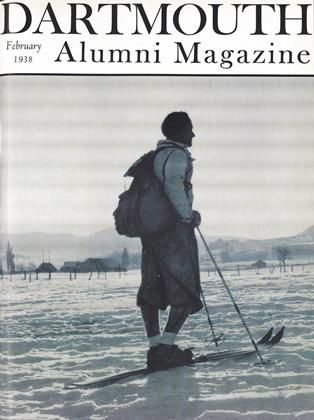by Charles R. Bagley. D. Appleton-Century Cos. p. 498. $2.50.
The announced intention of Professor Bagley in publishing this textbook is to put a simple but fairly comprehensive study of the Golden Age of French literature into the hands of American students for whom the standard histories of literature are too advanced or too much weighted with scientific criticism. But the book is much more than a primer or an anthology. It is an introduction to the lives and works of the great writers of the period—a solid volume of nearly five hundred pages, rather evenly divided between critical apparatus and copious extracts from the various authors involved.
By universal verdict the seventeenth century is the most glorious period of French literature, but that does not mean that it can be easily appreciated by foreigners. "Classicism," for example, makes little appeal to American undergraduates, who are congenitally romantic in their taste. To be sure, the whole world can enjoy Moliere and perhaps also La Fontaine; it may be, as Professor Bagley remarks, that nearly every one can feel the inspiration of Corneille; but Boileau, and above all Racine, the fine flower of French classicism, remain a closed book to most outsiders. It is therefore not an easy task to reveal the true greatness of the Golden Age, and the author recognizes this fact quite frankly. Nor does he fail to note the shortcomings of the poets of that age: "The writers who followed him (Malherbe) achieved reason, simplicity, and clarity, but their individualism suffered, and for nearly two centuries poetry lost its lyrical and spontaneous qualities." And he adds a generalization that is admirable for its succinct justness: "Narrow in scope, lacking in new ideas, but finished in form, universal in application, simple, true, and beautiful—such are the masterpieces of French classical literature."
Although in a book serving this purpose the emphasis is rightly laid more upon personalities than upon underlying forces, the author nevertheless does make clear the determining influences. He remarks: "The imitation of Classical Greece was an important element in French classicism of the seventeenth century, but it was by no means the only one. Other elements were Roman common sense, rationalism as expressed by Descartes, the spirit of authority as exercised by Louis XVI, the conception of absolute monarchy, the spirit of Christianity." He is not so dazzled by the splendor of Versailles as to overlook the dark side of the picture. He observes that at no other time in the history of France was there so much social injustice and unnecessary suffering among the masses of the people.
It is a most competent piece of workmanship throughout; indeed I know of no other book that can approach it in its particular field. It has already been tried out in manuscript in different courses in our French department, and with success.
I should like to add the hope that it may be introduced into many other institutions. In my copy an unfortunate error of the printer reproduces page 368 on page 265, with the result that the contents of the latter are lacking. But that matter is easily remedied
Training for Winter Sports, a brief article by Professor Harry Hillman appears in the December number of NewEngland Winter.
Mr. Charles H. Voelker is the author of A Comparative Study of Stutterers, FormerStutterers and Normal Speakers WhoseHandedness has been Changed, which appears in the March issue of Journal ofSpeech Disorders.
The October issue of the ShakespeareAssociation Bulletin contains an article by Professor A. A. Raven entitled There areMore Things, Horatio.
 View Full Issue
View Full Issue
More From This Issue
-
 Article
ArticleThe D. O. C. Started Something
February 1938 By CHARLES E. WIDMAYER '30 -
 Article
ArticleGradus Ad Parnassum
February 1938 By The Editor -
 Class Notes
Class NotesClass of 1914
February 1938 By Edward Leech -
 Class Notes
Class NotesClass of 1937
February 1938 By Donald C. Mckiniay -
 Class Notes
Class NotesClass of 1910
February 1938 By Hap Hinman -
 Class Notes
Class NotesClass of 1930
February 1938 By Albert Dickerson
W. K. Stewart
Books
-
 Books
BooksAlumni Articles
JANUARY 1970 -
 Books
BooksGuiding Hopefuls
October 1976 By FRANK A. LOGAN '52 -
 Books
BooksPROPAGANDA-ITS PSYCHOLOGY AND TECHNIQUE
February 1936 By Henry S. Odbert '30 -
 Books
BooksEND OF ROAMING
November, 1930 By Herbert F. West -
 Books
BooksA SOURCE BOOK OF AMERICAN POLITICAL THEORY.
FEBRUARY 1930 By Luther H. Evans -
 Books
BooksTHREE MASTERS
JUNE 1930 By Sidney Cox





